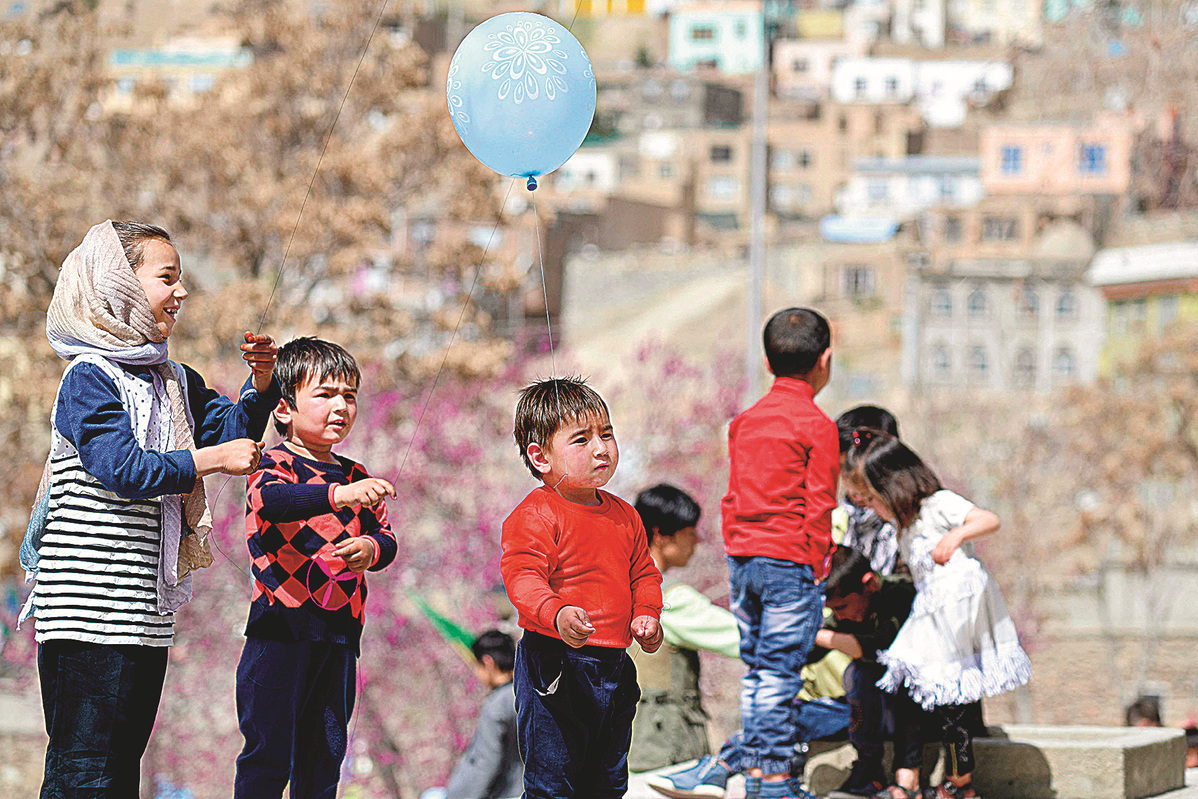Islamic states work together for Afghans
By XU WEIWEI and JAN YUMUL in Hong Kong | China Daily Global | Updated: 2022-03-24 09:37

Show of support for war-torn nation at OIC meeting at heart of call for unity
Calls have been issued for unity among Islamic nations as they face shared problems around the globe, with support for war-torn Afghanistan a key rallying point at a high-level meeting in Islamabad.
The appeals were made at the 48th session of the Council of Foreign Ministers of the Organisation of Islamic Cooperation, or OIC, a two-day event in the Pakistani capital that ended on Wednesday. The discussions on further support for Afghanistan were welcomed by participants and analysts, as was the launch on Monday of a trust fund to provide humanitarian aid and enable rebuilding efforts in the nation.
Pakistani Prime Minister Imran Khan said during his keynote speech that it is important for nations to help Afghanistan and that sanctions imposed on the country should be removed to avoid a humanitarian crisis and strengthen the fight against terrorism.
With the theme Building Partnerships for Unity, Justice and Development, the event also featured discussions on sustainable development and climate change, taking in regional and global perspectives, according to Pakistan's Foreign Ministry.
Secretary-General of the OIC Hissein Brahim Taha said that efforts should be made to bring stability to Afghanistan, adding that Muslim countries should continue providing financial support to the nation.
In a meeting with visiting Chinese State Councilor and Foreign Minister Wang Yi, Khan stressed that cooperation among China, Afghanistan and Pakistan can help bring more stability to Afghanistan and boost its connections with countries in the region.
Amina Khan, director of the Centre for Afghanistan, Middle East and Africa at the Institute of Strategic Studies in Islamabad, said: "Hopefully more pledges on Afghanistan will be made, and those pledges that were made before can be instrumentalized to help" the war-ravaged nation.
On Monday, the OIC and the Islamic Development Bank signed in Islamabad the Charter of the Humanitarian Trust Fund for Afghanistan to raise donations for the Afghan people, according to the OIC. The signing means the fund's work can now get underway.
Taha and Muhammad Sulaiman Al Jasser, the president of the development bank, inked the charter in the presence of Pakistani Foreign Minister Shah Mahmood Qureshi, Pakistan's Foreign Ministry said in a statement.
At the signing ceremony, Qureshi said the dire humanitarian situation in Afghanistan warranted urgent action. He asked the OIC members, Islamic financial institutions, and other international partners to donate to the trust fund. Efforts to aid Afghans must be redoubled, Qureshi said.
Mehmet Rakipoglu, a Gulf and Middle East expert and researcher at Sakarya University's Middle East Institute in Turkey, said the fund will "directly help Afghanistan in a positive manner". For the Taliban administration in charge of Afghanistan, the biggest challenge is the economy. With that in mind, the fund will be very helpful, Rakipoglu said.
Trust fund
Under the supervision of the development bank, the fund will serve as a mechanism to send continuous humanitarian aid to Afghanistan.
In October, the United Nations established a special trust fund to provide cash directly to the Afghans via a system that makes use of donor funds frozen since the Taliban's takeover in August 2021.
Arhama Siddiqa, a Middle East and North Africa expert and research fellow at the Institute of Strategic Studies Islamabad, said that a stable Afghanistan is the need of the hour, "not only for the entire region, but by domino effect, the world at large".
She said the establishment of the fund is an important outcome of Pakistan's chairmanship of the OIC Council of Foreign Ministers for 2022. The fund "takes on a comprehensive approach in that its prime objective is to induce economic self-reliance in the Afghan people, by targeting various sectors which include the agricultural sector and the revamping of small and medium-sized enterprises", she said.
"Undoubtedly, it is a first, pivotal step which will hopefully pave way for unhindered humanitarian aid to Afghanistan to provide much-needed functionality and stability."
Xinhua contributed to the story.
- Biden hell-bent on fanning flames of crisis: China Daily editorial
- Washington again lays bare its hypocrisy in saying it seeks to mend relations with Beijing: China Daily editorial
- Claim made that Johnson assisted animal charity's Afghanistan evacuation
- China demands US revoke sanctions on Chinese officials
























